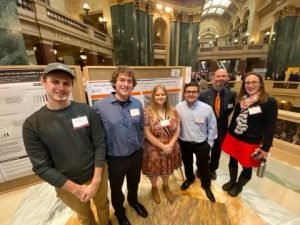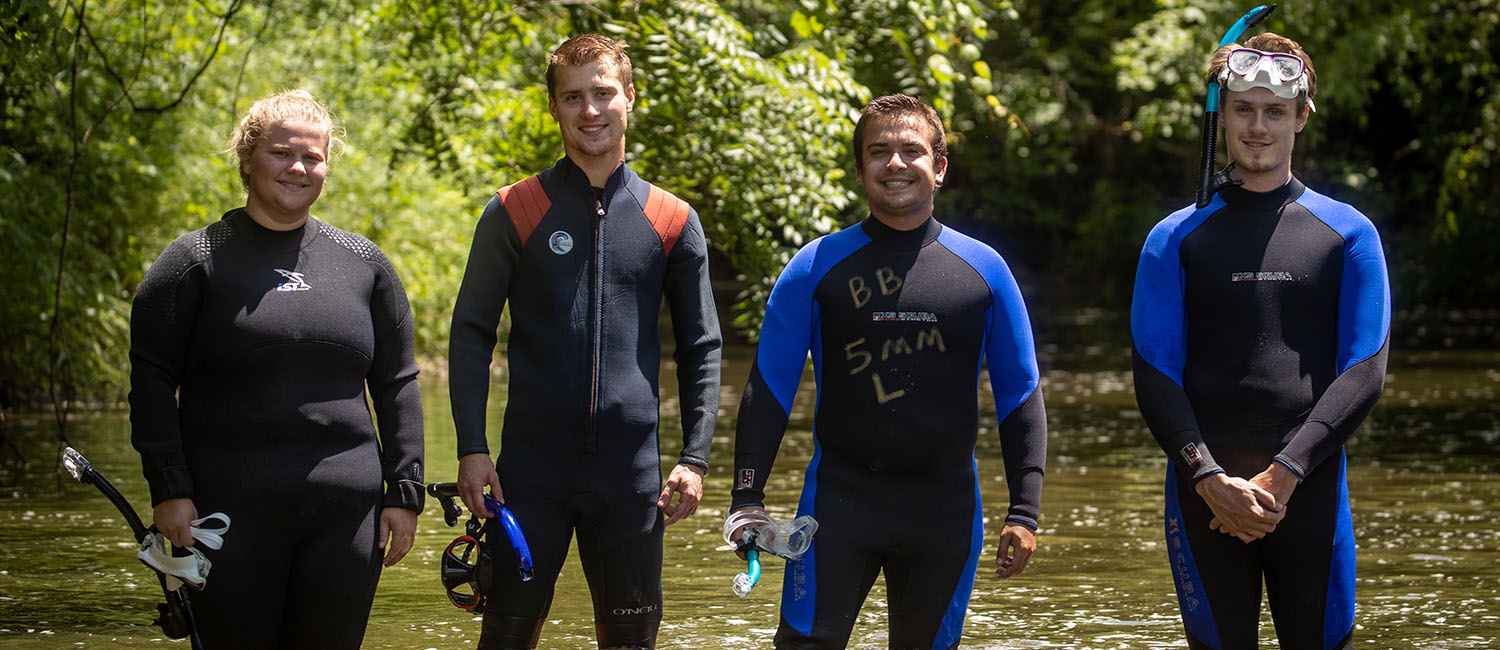The ability to design and implement a species population survey is an essential skill for a water scientist — as is knowing how to analyze and present the findings to diverse audiences.
Through a grant from the Freshwater Collaborative of Wisconsin, 10 undergraduates at UW-Platteville learned these valuable skills — and the Wisconsin Department of Natural Resources (WDNR) gained valuable information about native freshwater mussel populations in southwestern Wisconsin. The research could also provide valuable insight into agricultural water management, one of the 10 Grand Water Challenges identified by the Freshwater Collaborative and the Wisconsin State Legislature.
“The presence or absence of mussel diversity, when paired with our water chemistry and physical habitat sampling, will certainly provide insight on the success of local agriculture water management and water quality safety initiatives,” says Dr. Rebecca Doyle-Morin, principal investigator on the project.
Students evaluated multiple river systems, including the Platte, Grant, Rountree Branch, Pecatonica and Bonner Branch, along with a series of trout streams in northern Grant. They looked for mussels and completed habitat and biotic surveys for each. The even discovered an unknown population of mussels in the restored Sunfish Lake in Hazel Green and assessed that population and its seasonal habitat and biotic community.
The field work was guided by numerous water professionals. Staff from the WDNR helped students design and execute mussel surveys. Dr. Kris Wright, a river ecologist and instructor at UW-Platteville, showed students how to assess fish populations and habitats. In the lab, students identified and quantified aquatic organisms, conducted extensive data analysis and learned how to effectively clean and preserve mussel shells for outreach and educational purposes.
“This research helps fill information gaps within watersheds that contain state and federally protected mussel species,” says Jesse Weinzinger, a conservation biologist for the WDNR’s Wisconsin Mussel Monitoring Program who worked with the students. “These places supporting mussels and their habitat can provide important information and maximize opportunities for successful conservation.”
Students also worked with the Mississippi River Museum and Aquarium in Dubuque, Iowa, to set up monitoring silos for mussel habitat relocation. They engaged with the public at the Upper Sugar River Mussel Monitoring Workshop and spoke at a virtual workshop during Wisconsin Water Week. Students also presented their research at various seminars, including Research in the Rotunda at the State Capitol.

“It was really cool to learn about the different techniques; taking measurements from kayaks was definitely interesting. I learned a lot of skills that will help in the future,” says Jeremy Kohler, one of the students who presented at Research in the Rotunda in March.
All three of the undergraduates who participated in the first year of the project have graduated and begun jobs related to their majors. Kohler, who is a junior at UW-Platteville and participated in the second year of the project, plans to complete an internship working with fisheries before graduation.
Student training on this project won’t end with this grant — Doyle-Morin and Wright recently received a new grant from the Freshwater Collaborative to continue the work with additional students this summer.
“This research has and is providing students with the research experiences they need to be competitive and prepared for entering the workforce directly following graduation from UW-Platteville,” Doyle-Morin says.
Students on this project shared their experience in a video posted on the UW-Platteville Biology Department Facebook page

